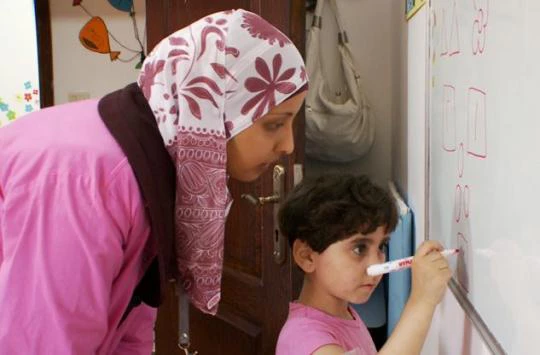
The Middle East and North Africa (MENA) is a rising middle-income region, and its citizens rightly expect quality public services. Yet too often they experience disappointment: students attending local schools are insufficiently prepared for the 21st century economy, and those needing health care too often find public clinics with no doctors or medicines.
Few in positions of authority are held accountable for such shortcomings. This situation both undermines the potential for improvement and heightens people’s unhappiness with the delivery system.
Although dissatisfaction with education and health services is widespread in the MENA region, local successes do exist and offer inspiration. At the Kufor Quod Girls’ Secondary School in the rural West Bank, for example, Ms. Abla Habayeb, the school’s principal, provides her teachers with daily encouragement and support, and she involves community members, parents, and teachers in decisions about improving the school.
Teachers, students, and the community then reciprocate that commitment. Thus amid the surrounding poverty and instability, Kufor Quod girls excel in national tests. Similarly, in some poor villages in Jordan and Morocco, the leaders of schools and clinics are reaching out to the community, inspiring citizens’ trust and engagement through transparent and inclusive decision-making and the delivery of excellent services.
Learning from such local successes is vital because there are no blueprints for solving service quality problems. Countries around the world are striving to improve education and health care, but simply modernizing school and hospital facilities and training staff are no longer sufficient.
Delivering quality services requires motivated staff, and staff motivation arises from values and accountability, which are grounded in the wider political, administrative, and social rules, practices, and relationships. Providing high-quality services is hard; the World Bank itself has struggled to ensure that its projects enhance incentives in country systems to achieve better learning and health outcomes.
Finding solutions is especially difficult in the institutional and sociocultural contexts in the MENA region. Its citizens not only demand better services but also expect their government to provide them, reflecting the promises made by Arab leaders at the outset of independence five decades ago that the state would provide better living conditions.
Since then, MENA citizens have gained nearly universal access to education and health care, which is a commendable achievement. Now they expect these services to be of high quality and to create greater opportunities for all.
Although they have excelled at building schools, constructing hospitals, and training staff, the region’s societies have fallen short in fostering the accountability and values needed to motivate public servants and service providers to deliver quality services.
Whether and how teachers teach, doctors treat the sick, and bureaucrats react to citizens’ demands do not seem to matter in the selection of leaders (and their promotions and salary increases) or in the social acceptance of public servants. Rather than performance, what seems to matter most for political and professional careers are personal relationships and social ties.
This limits citizens’ trust in and formal engagement with public institutions. To fulfill their needs, citizens rely on their own relationships or informal fees. Thus a cycle of poor performance has emerged, perpetuating a culture of privilege and cronyism.
Improving the quality of public services will require breaking this cycle of poor performance and making politicians, public servants, and providers accountable to citizens and promoting citizens’ trust in and engagement with state institutions.
At the local level, leaders and communities can inspire change by demonstrating possible local solutions and pointing to the remaining system-wide constraints. Communities, states, and donors that succeed in improving service quality and accountability will go a long way towards earning and retaining citizens’ trust.
This story draws on the forthcoming flagship report Trust, Voice, and Incentives: Learning from Local Success Stories in the Middle East and North Africa Region, developed by a multidisciplinary team led by Hana Brixi, Global Lead for Public Service Delivery, GGP and including experts from the Governance, Education, and HNP Global Practices, DEC, and the MENA Region. The report will be launched at the Spring Meetings on April 16, 2015. Click here to visit the event page and to watch live webcast on April 16.


Join the Conversation